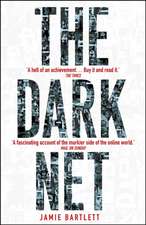Serbia and the Balkan Front, 1914: The Outbreak of the Great War
Autor James Lyonen Limba Engleză Paperback – 29 iul 2015
| Toate formatele și edițiile | Preț | Express |
|---|---|---|
| Paperback (1) | 181.77 lei 6-8 săpt. | +49.58 lei 7-13 zile |
| Bloomsbury Publishing – 29 iul 2015 | 181.77 lei 6-8 săpt. | +49.58 lei 7-13 zile |
| Hardback (1) | 715.73 lei 6-8 săpt. | |
| Bloomsbury Publishing – 29 iul 2015 | 715.73 lei 6-8 săpt. |
Preț: 181.77 lei
Preț vechi: 209.42 lei
-13% Nou
34.79€ • 36.18$ • 29.11£
Carte tipărită la comandă
Livrare economică 15-29 martie
Livrare express 08-14 februarie pentru 59.57 lei
Specificații
ISBN-10: 1472580044
Pagini: 328
Ilustrații: 29 bw illus
Dimensiuni: 156 x 234 x 18 mm
Greutate: 0.5 kg
Editura: Bloomsbury Publishing
Colecția Bloomsbury Academic
Locul publicării:London, United Kingdom
Caracteristici
Notă biografică
James Lyon is an Associate Researcher at the University of Graz, Austria. He has a PhD in History from the University of California, Los Angeles, USA and has published extensively on the history of the Balkans. He founded the Foundation for the Preservation of Historical Heritage, which is working to digitalize rare document collections in leading Balkan cultural institutions.
Cuprins
1. A Sunday in Sarajevo2. A Third Balkan War?3. Parallel Structures and Hostile Neighbors4. “A Peasant Mob”5. The Guns of July6. Lightening on Mount Cer7. The Battle on the Drina, Invasion of Srem, and Mackov Kamen8. Defeat and Hemorrhage9.The Battle on the Kolubara10. One Man’s Triumph, Another Man’s Victory11. The AftermathBibliographyIndex
Recenzii
None will cover the Serbian campaigns of 1914 in as much detail as Serbia and the Balkan Front.
In the flood of historical literature brought to market for the centenary of the First World War, this book stands as a unique and significant contribution. In contrast to most other histories of the war, which either ignore the Balkan front altogether or else base their accounts of it on German-language sources reflecting the sensibilities of Serbia's opponents, Lyon's work is grounded in extensive research in Serbian archives. He provides perhaps the most accurate assessment yet published in the English language of the mentality and actions of Serbia's leaders in 1914, as they alternately rode and reined in the passions of Serbian nationalism in the wake of their country's spectacular successes in the Balkan Wars.
Descriere
Serbia and the Balkan Front, 1914 is the first history of the Great War to address in-depth the crucial events of 1914 as they played out on the Balkan Front. James Lyon demonstrates how blame for the war’s outbreak can be placed squarely on Austria-Hungary’s expansionist plans and internal political tensions, Serbian nationalism, South Slav aspirations, the unresolved Eastern Question, and a political assassination sponsored by renegade elements within Serbia’s security services. In doing so, he portrays the background and events of the Sarajevo Assassination and the subsequent military campaigns and diplomacy on the Balkan Front during 1914.The book details the first battle of the First World War, the first Allied victory and the massive military humiliations Austria-Hungary suffered at the hands of tiny Serbia, while discussing the oversized strategic role Serbia played for the Allies during 1914. Lyon challenges existing historiography that contends the Habsburg Army was ill-prepared for war and shows that the Dual Monarchy was in fact superior in manpower and technology to the Serbian Army, thus laying blame on Austria-Hungary’s military leadership rather than on its state of readiness. Based on archival sources from Belgrade, Sarajevo and Vienna and using never-before-seen material to discuss secret negotiations between Turkey and Belgrade to carve up Albania, Serbia’s desertion epidemic, its near-surrender to Austria-Hungary in November 1914, and how Serbia became the first belligerent to openly proclaim its war aims, Serbia and the Balkan Front, 1914 enriches our understanding of the outbreak of the war and Serbia’s role in modern Europe. It is of great importance to students and scholars of the history of the First World War as well as military, diplomatic and modern European history.




















